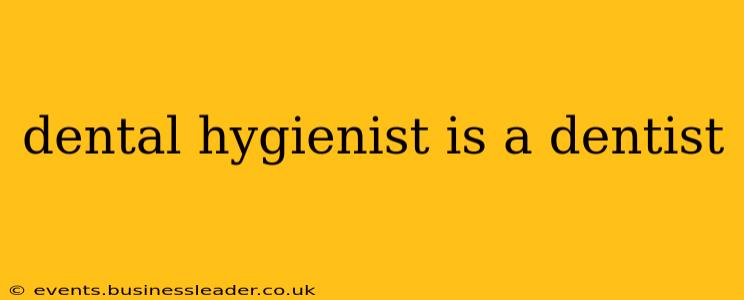Dental Hygienist vs. Dentist: What's the Difference?
The question, "Is a dental hygienist a dentist?" is a common one, and the simple answer is no. While both dental hygienists and dentists work in the dental field and collaborate closely, their roles, training, and responsibilities are distinctly different. Understanding these differences is crucial for patients seeking proper oral care.
This article clarifies the distinctions between these two vital members of a dental healthcare team and answers some frequently asked questions.
What does a dentist do?
Dentists are the primary care providers for oral health. They have extensive training, typically requiring a minimum of eight years of education after high school, including four years of undergraduate study and four years of dental school. Their responsibilities encompass a wide range of procedures, including:
- Diagnosing and treating oral diseases: This includes conditions like cavities, gum disease (gingivitis and periodontitis), oral cancer, and temporomandibular joint (TMJ) disorders.
- Performing dental procedures: This covers fillings, extractions, root canals, crowns, bridges, dentures, and implants.
- Developing and implementing treatment plans: Dentists create customized plans based on a patient's individual needs and oral health status.
- Prescribing medication: They can prescribe antibiotics, pain relievers, and other medications to manage oral health problems.
- Performing cosmetic dentistry: Procedures like teeth whitening, veneers, and bonding fall under this category.
- Orthodontics: While some dentists specialize in orthodontics, many refer patients to orthodontists for braces and other orthodontic treatments.
What does a dental hygienist do?
Dental hygienists are integral members of the dental team, focusing on preventive oral care. Their education involves obtaining an associate's or bachelor's degree in dental hygiene, typically requiring two to four years of study after high school. Their primary roles include:
- Providing preventative care: This is their main focus, including cleaning teeth to remove plaque and tartar, polishing teeth, applying fluoride treatments, and educating patients on proper oral hygiene techniques.
- Taking dental radiographs (x-rays): Hygienists are trained to take and develop x-rays, aiding dentists in diagnosis.
- Applying sealants: These protect the chewing surfaces of teeth from decay.
- Screening for oral diseases: Hygienists can identify potential problems and alert the dentist.
- Providing patient education: They educate patients on proper brushing, flossing, and dietary habits to maintain optimal oral health.
What is the difference between a dental assistant and a dental hygienist?
While both work alongside dentists, their roles differ significantly. Dental assistants provide chairside assistance to dentists during procedures, sterilize instruments, take x-rays (under the dentist's supervision), and handle administrative tasks. Dental hygienists, however, have a much more independent and comprehensive role in providing preventive care and patient education. They require more extensive education and licensing.
Can a dental hygienist diagnose and treat dental problems?
No, dental hygienists cannot diagnose or treat dental problems independently. They work under the supervision of a dentist, who is responsible for diagnosing and creating treatment plans. While hygienists identify potential issues, the dentist makes the final diagnosis and determines the appropriate course of action.
What are the educational requirements for becoming a dental hygienist vs. a dentist?
Becoming a dentist requires significantly more education. Dentists need to complete four years of undergraduate study followed by four years of dental school. Dental hygienists typically complete an associate's or bachelor's degree in dental hygiene, usually a two to four-year program.
How do I choose between seeing a dentist and a dental hygienist?
You should see a dentist for comprehensive oral health examinations, diagnosis of dental problems, and treatment of dental diseases or injuries. You should see a dental hygienist for routine cleanings, preventive care, and patient education on maintaining optimal oral health. Regular visits to both are crucial for maintaining excellent oral health.
In summary, while both professions are essential to comprehensive oral healthcare, dentists provide diagnosis and treatment, while dental hygienists focus on prevention and patient education, working collaboratively to ensure optimal oral health for their patients.
